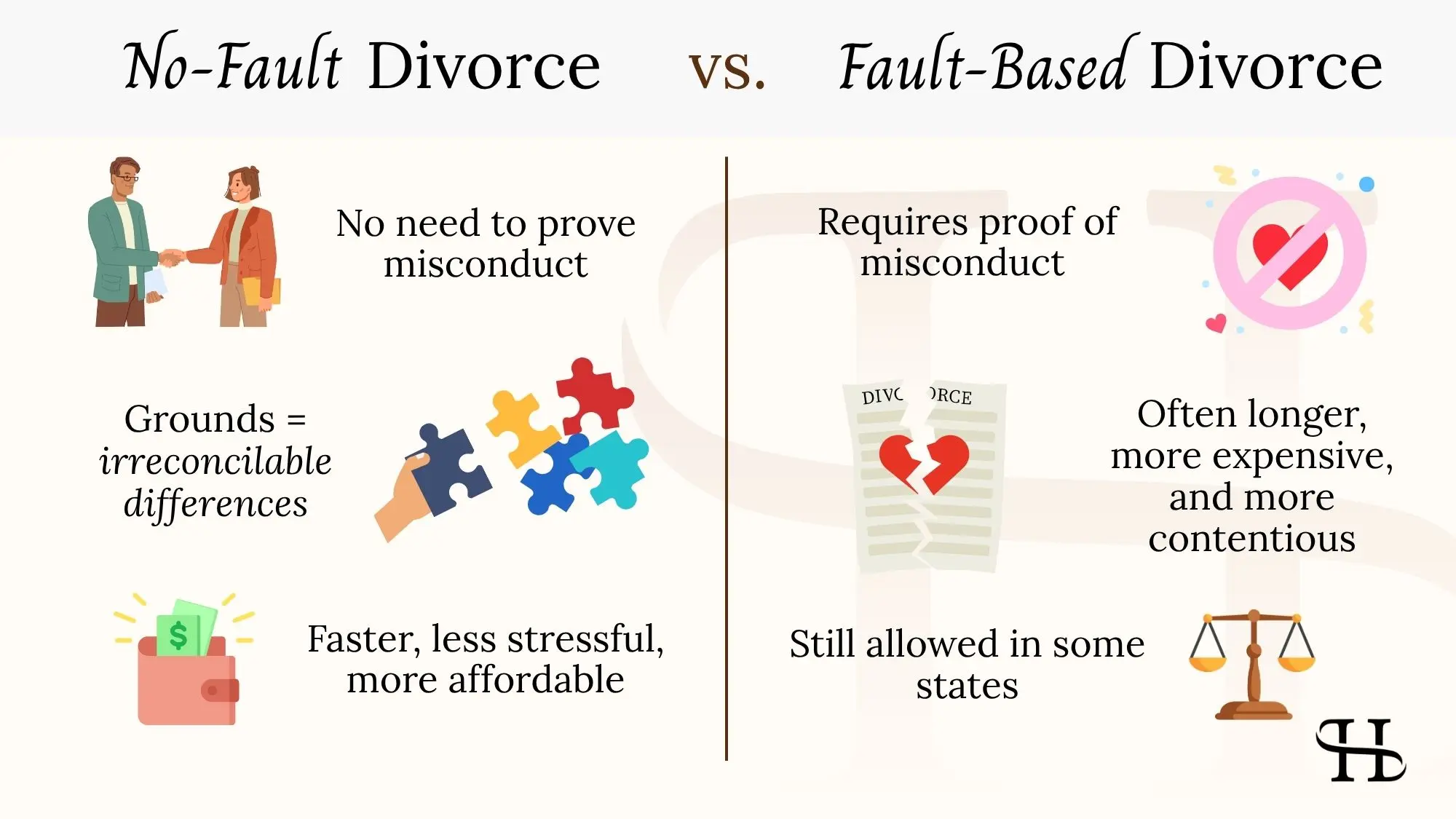Life transitions can be challenging, especially when they involve important legal and financial decisions that affect your family and future. Questions about property, responsibilities, and the path forward can feel overwhelming without the right support, especially when you’re also dealing with something as emotional as a divorce.
Every situation is different, which is why understanding your legal options is important. Working with our experienced Sacramento divorce attorneys can give you the clarity and protection you need while making informed choices about the next chapter of your life.
What Is a No-Fault Divorce?
A no-fault divorce allows spouses to legally end their marriage without placing blame on either party. In this type of system, one spouse does not need to provide evidence of misconduct to dissolve the marriage — the only requirement is showing that the breakdown of the marriage has occurred beyond repair, often described legally as irreconcilable differences.
This approach contrasts with a fault-based divorce, which is still recognized in some states. Fault-based divorce systems require assigning blame for the end of the marriage. In a fault-based divorce, one spouse must prove the other was guilty of specific misconduct, such as:
- Adultery
- Abandonment
- Domestic violence or cruelty
- Substance abuse
- Imprisonment
- Affair
Fault-based divorce can be emotionally draining due to the need to gather evidence and prove misconduct in court.
Because no-fault divorce removes the burden of proving wrongdoing, it generally makes the divorce process faster, less stressful, and more cost-effective for couples who simply cannot continue their marriages.

Can You Get Divorced in California Without Proving Fault?
Yes, California is a no-fault divorce state, and the legal process of ending a marriage is often referred to as a "dissolution" (another term for divorce in California). The divorce filing process in California is designed to be straightforward under the no-fault system. In a California divorce, either spouse can file for divorce without proving wrongdoing by the other. The only grounds for divorce in California are “irreconcilable differences” and “permanent legal incapacity”.
The Role of Irreconcilable Differences
Courts interpret irreconcilable differences as serious and ongoing issues that make reconciliation impossible, such as constant conflict, loss of emotional connection, or fundamentally different life goals. Minor disagreements are not enough; the marriage must be shown to be beyond repair.
A Brief History of No-Fault Divorce in California
California made legal history in 1969 when then-Governor Ronald Reagan signed the Family Law Act, making California the first state to allow no-fault divorce. Before this law, divorce was only possible if one spouse could prove the other was at fault.
The old system often led to fabricated claims, such as spouses would stage affairs or invent misconduct just to meet the legal grounds for divorce. This not only burdened the court system but also damaged the integrity of the legal process.
California’s adoption of no-fault divorce was groundbreaking, and by the 1980s, most other U.S. states followed suit. Today, every state offers some form of no-fault divorce, though some also still allow fault-based divorces.
How No-Fault Divorce Works in California
The divorce process is relatively straightforward under California law. The parties involved in the divorce benefit from a system designed to reduce conflict and simplify legal proceedings:
- Only one spouse needs to file: Your partner’s consent is not required.
- Grounds for divorce: “Irreconcilable differences” is the sole reason needed.
- Key issues resolved during divorce proceedings:
- Division of marital property and debts (community property rules apply)
- Spousal support (alimony)
- Child custody and visitation
- Child support
Because fault is not a factor, the court will not penalize a spouse financially or through child custody decisions simply because of misconduct such as adultery. Instead, the focus remains on equitable division of assets and the best interests of the children.
Are There Any Exceptions Where Fault Matters?
Even though California is a no-fault divorce state, there are limited situations where misconduct or wrongdoing can still influence the outcome of a case:
- Breach of fiduciary duty: If one spouse hides assets or misuses marital funds, the court may award the innocent spouse a larger share of property.
- Domestic violence or abuse: Evidence of abuse can impact child custody and visitation decisions, as courts prioritize the child’s safety and best interests.
- Annulment (nullity): Unlike divorce, annulment argues that the marriage was never legally valid (due to fraud, bigamy, or incapacity).
These exceptions do not undermine the no-fault system, but they simply allow the court to protect fairness and safety when serious issues are at play.
Benefits of No-Fault California Divorces

The advantages of no-fault divorce in California are significant:
- Less conflict: Couples don’t have to air personal grievances in court.
- Faster and more affordable: Eliminating the need to prove fault reduces legal fees and delays.
- Encourages mediation: Many couples pursue collaborative divorce or mediation, leading to more cooperative solutions.
- Protects victims of abuse: A spouse can file for divorce without having to provide painful or dangerous evidence of abuse.
- Better outcomes for children: Reduced hostility between parents can lessen the emotional toll on children.
- Research-backed benefits: Studies have shown that states with no-fault divorce laws see lower rates of domestic violence and female suicide.
Criticisms of No-Fault Divorce
While no-fault divorce offers many benefits, it is not without critics. Some of the main criticisms include:
- Divorce is “too easy”: Critics argue it weakens the institution of marriage by making separation more accessible.
- Unilateral divorce: One spouse can end the marriage even if the other wants to stay.
- Financial concerns: A dependent spouse may feel disadvantaged if the divorce proceeds quickly without acknowledgment of the other’s misconduct.
- Impact on children: Some argue that easier California divorces contribute to instability in children’s lives.
Despite these criticisms, courts and most experts recognize that forcing people to stay in an unhappy marriage often causes more harm than good.
Moving Forward Under California’s No-Fault Divorce Law
California’s no-fault divorce system reshaped family law by focusing on fairness rather than blame. While it has both benefits and criticisms, it remains the foundation of how California divorces are handled in the state today. Understanding how irreconcilable differences work, when fault may still matter, and what to expect in the process can help you make informed decisions. If you are considering divorce, seek legal guidance from experienced attorneys to navigate the complexities of California divorce and ensure your interests are protected. Contact Hopper Hopper & Strebe to protect your rights.





.avif)
.avif)



